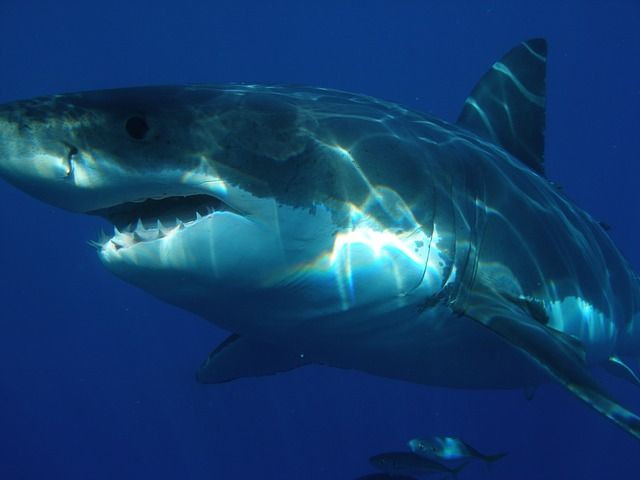What Great White Sharks Really Eat Might Surprise You
KEY POINTS
- Researchers found that great white sharks have a varying diet, which includes bottom-dwelling fish
- Bigger great white sharks tend to eat food that is higher in fat, likely to prepare themselves for migration
- Studying shark diet could help inform conservation efforts for great white sharks
Researchers studying the diet of Great White Sharks were surprised to find what the apex predators really eat. And what they found could offer insights into what really drives human-shark conflicts.
People often think that Great White Sharks hunt for prey close to the water surface, mostly because of the ominous and ubiquitous images of the predator's dorsal fin cutting through the water. However, the researchers of a new study published June 7 in the journal Frontiers in Marine Science found that this may not be the case.
For the study, which was published right on time for World Oceans Day on June 8, the research team examined the stomach contents of 40 juvenile white sharks caught in the New South Wales Shark Meshing Program, and compared them with data gathered from other parts of the world, particularly in South Africa.
The researchers found that Great White Shark diet actually varies, noting mid-water ocean swimming fish, bottom-dwelling fish, reef fish and batoid fish, such as sting rays, as the food that the young sharks relied on for their diet. In fact, the great white sharks' diet relied mostly on mid-water ocean swimming fish (32.2%) and bottom-dwelling fish (17.4%).
"This indicates the sharks must spend a good portion of their time foraging just above the seabed," study lead author Richard Grainger of the University of Sydney said. "The stereotype of a shark's dorsal fin above the surface as it hunts is probably not a very accurate picture."
Once the sharks reach about 2.5 meters in length, that's when they start to include mammals in their diet.

The researchers also found that larger sharks tend to consume food that is higher in fat. According to the researchers, this could be the sharks' way of consuming food to meet their energy needs to prepare for migration.
"This fits with a lot of other research we've done showing that wild animals, including predators, select diets precisely balanced to meet their nutrient needs," study co-author and Chair of Nutritional Ecology in the School of Life and Environmental Sciences at the university, Professor David Raubenheimer, said.
In an interview with The Sydney Morning Herald, Grainger noted the importance of studying what and where great white sharks eat to inform people about the places to avoid to minimize accidental interactions with sharks. He also clarified that shark attacks on humans are likely cases of mistaken identity and not as a result of the sharks directly targeting humans.
Further, having a better idea of the great white sharks' diet could help inform the conservation strategies for the already vulnerable species.
"Understanding the nutritional goals of these cryptic predators and how these relate to migration patterns will give insights into what drives human-shark conflict and how we can best protect this species," study co-author and adjunct Senior Research Fellow at the Charles Perkins Centre, Dr. Gabriel Machovsky-Capuska, said.
© Copyright IBTimes 2024. All rights reserved.






















